2020 NAEd/SPENCER RESEARCH DEVELOPMENT AWARDEES
Jasmine Alvarado, Boston College

Jasmine Alvarado is a Ph.D. Candidate in Curriculum and Instruction at Boston College Lynch School of Education and Human Development. Her research interests are in bilingual teacher education, language use and literacies of bilingual students, and Latinx studies. Through archival and ethnographic methods, her dissertation explores how the lived experiences of families in a bilingual program intersect with broader community discourses and policies in a gentrifying neighborhood in the Greater Boston Area. During her time at Boston College, Jasmine has worked with teachers, school administrators, and families across school districts in the Greater Boston Area to design policies, practices, and pedagogies that promote the learning, well-being, and creative expression of bilingual students. In addition to the NAEd/Spencer Foundation Fellowship, Jasmine’s work has received financial support from the National Academies of Sciences, Engineering, and Medicine on behalf of the Ford Foundation. Before starting doctoral studies, she was a bilingual elementary teacher and an after-school program director in New York City Public Schools. Jasmine received a B.A. in Hispanic Studies and Government from Harvard University and an M.A. in Bilingual Childhood Education from CUNY-Hunter College.
Traversing Multiple Spaces and Places: An Ethnographic Study of Families in a Two-Way Immersion Program in a Gentrifying Community
Research that examines the impact of gentrification on U.S. public schools reveals that we know surprisingly little about the experiences of low-income families of color. In the field of bilingual education, few studies include the experiences of low-income families of color to understand the role of gentrification in two-way immersion (TWI) programs, where children from multiple racial, cultural, and economic backgrounds are educated together with the goals of bilingualism and biliteracy. Given the limited research that regards low-income families of color as dynamically interactive with their educational surroundings, this dissertation study centers the experiences of TWI families, from various race and class backgrounds, as integral forces that constantly influence relations within and across communities. To these ends, this research study examines the experiences of families in a TWI program within the broader frame of how race and class affect their ways of interacting in an educational space, for which gentrification influences the program’s nature. It combines archival research that documents demographic changes of a neighborhood in the Greater Boston Area with an ethnographic study of families in a TWI program. Informed by spatial theories and analyses, this study adds innovative conceptual and methodological approaches to the limited literature on families’ experiences in TWI programs located in U.S. gentrifying communities, and, more broadly, to studies on the intersection of race and class with the experiences of families in public schools within gentrifying U.S. neighborhoods.
Cassie J. Brownell, University of Toronto-Ontario Institute for Studies in Education [OISE]
Cassie J. Brownell is an Assistant Professor of Curriculum, Teaching, and Learning in the Ontario Institute for Studies in Education (OISE) at the University of Toronto. Framed by her experiences as an early childhood educator in post-Katrina New Orleans and her role as an international research partner for the MakEY Project, Dr. Brownell uses feminist and poststructural modes of inquiry to critically consider how education might become more inclusive of children’s cultural, linguistic, and modal ways of knowing. In taking an interdisciplinary approach to her work, Dr. Brownell bridges scholarship from literacy and social studies education alongside critical childhood studies to examine children’s sociopolitical development and civic participation.
Dr. Brownell’s prior research has been funded by the International Literacy Association, the National Council of Teachers of Education, and Canada’s Social Sciences and Humanities Research Council. Additionally, her scholarship has been recognized with awards from the American Educational Research Association’s Writing & Literacies SIG and the Language and Social Processes SIG. Samples of her research can be found in the pages of the Journal of Curriculum and Pedagogy, Curriculum Inquiry, The Reading Teacher, and Language Arts.
Originally from Montana, Dr. Brownell earned a B.A. in Social Welfare and Justice Studies from Marquette University before she obtained a Master of Elementary Education (K-6) from the University of Notre Dame. She received her doctorate in Curriculum, Instruction, and Teacher Education from Michigan State University in 2018.

Growing Democracy: Examining Children’s Civic Literacies in Presidential Election Years
Schools have traditionally been seen as sites to foster democracy. Typically, democracy is defined as civic participation in elections and other formal government processes. In this study, by contrast, I build on recent reconsiderations of civic participation to explore civic literacies, a concept I use to account for the sociopolitical identities that individuals and groups articulate using digitally-mediated literacy and collective activism.
Although there is a renewed interest in civics within educational circles, much of the research focuses on young adults close to voting age, despite that children form politically relevant social identities early on. Thus, more longitudinal research examining how children develop long- lasting preferences, affiliations, and habits of civic participation is needed. This work is especially critical in politically polarized U.S. society.
This qualitative study is among the first to trace children’s civic literacies within schools across time, age, and political landscapes. By closely examining children’s writing, action, and talk, this longitudinal study will consider how children engage with wider discourses and how they (re)produce political rhetoric. Findings will yield insights about how the civic life of children develops and broaden possibilities for teachers’ pedagogical practices and children’s civic literacies within schools.
Roderick L. Carey, University of Delaware
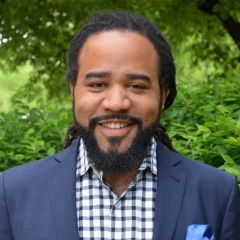
Roderick L. Carey is an Assistant Professor in the Department of Human Development and Family Sciences, in the College of Education and Human Development at the University of Delaware. Situated at the nexus of critical educational theories and constructs from sociology and developmental psychology, Roderick’s research primarily engages qualitative approaches to study the family- and school-based influences that shape how Black and Latino adolescent boys conceptualize their postsecondary school futures and enact college-going processes. He also foregrounds the social and school experiences of adolescent Black boys and young men through theoretical and empirical investigations into the phenomenon of “mattering.” His recent publications reside in outlets including the Harvard Educational Review, American Journal of Education, Race Ethnicity and Education, Journal of Applied Developmental Psychology, International Journal of Qualitative Studies in Education, Urban Review, Urban Education, and Educational Administration Quarterly. He serves on the Editorial Board for Urban Education and was recently presented the 2019-2020 Outstanding Service Award. Prior to his current appointment, Roderick spent two years as a Postdoctoral Research Fellow at the University of Pittsburgh’s Center for Urban Education. Roderick earned his Ph.D. in Curriculum and Instruction (Minority and Urban Education concentration) from the University of Maryland College Park; his Ed.M. in Human Development and Psychology from the Harvard University Graduate School of Education; and his B.A. in Secondary Education and English from Boston College. Before his academic career, Roderick spent four transformative years as a high school English teacher, coach, and performing arts coordinator in Washington, D.C. charter schools.
The Black Boy Mattering Project: Uncovering New Approaches for School Policies and Practices
With the rise of the Black Lives Matter movement, educational researchers are challenged now, perhaps more than ever, to help transform schools into environments where Black children feel valued, significant, or simply, where they “matter.” According to psychologists, the relational phenomenon “mattering” (e.g., I matter to family, peers, and within society) is essential to adolescents’ positive self-concept and school success. However, my prior work argues that oftentimes Black adolescent boys experience school-based “marginal mattering” when educators reinforce their insignificance through hyper-criminalization (e.g., evidenced in disproportional disciplining). Other times Black boys experience “partial mattering” when stakeholders cultivate and herald fragments of their skills and abilities (e.g., typically athletic). Schools that enforce these approaches risk leaving Black boys with limited self-concepts and diminished desires to matter in other ways to themselves and their communities. Yet, how might educators implement liberating practices so that Black boys infer their full, robust, or “comprehensive mattering” in schools? To support educators in creating such contexts and build mattering theory, “The Black Boy Mattering Project” investigates Black adolescent boys’ perceived and imagined mattering across multiple domains within two local high schools. Data sources for this within- and cross-case study analysis include individual student interviews, focus groups, observations, and group activities (e.g., artistic renderings) to elicit Black boys’ articulations (e.g., verbally and artistically) into how they perceive their present mattering and imagine comprehensive, liberating alternatives. Findings will illuminate and inspire reimagined policies and practices to guide stakeholders in creating radically affirming spaces where Black boys can matter comprehensively.
Aris Clemons, University of Texas at Austin
Aris Clemons is a PhD student in the Department of Spanish and Portuguese, as well as a graduate portfolio student in the Mexican American and Latina/o Studies Department at the University of Texas at Austin. She earned her MA in linguistic theory from Syracuse University in 2012 and continued her career as a high school Spanish teacher and administrator in Brooklyn, NY until the start of her doctoral studies at UT Austin in 2016. Originally from the San Francisco bay area, Aris was raised by a group of social activists who significantly impacted her commitment to justice for both linguistically and racially minoritized students. This formation has spurred her interest in culturally sustaining pedagogies as well as her commitment to mentoring students traditionally underrepresented in the academy. As a doctoral student she has had the opportunity to work as a Teaching Assistant for the Mellon Mays Undergraduate Fellowship Program and recently designed and taught a course entitled Racial Linguistics. As a scholar of language and race, her research examines how socially constructed categories are concretized in the public psyche. In particular, her work explores the impact of racial and linguistic ideologies and attitudes on the construction of ‘self’ at the individual and community level. Drawing on data from members of the emergent pan-ethnic grouping of Afro-Latinxs, her research problematizes racial and linguistic essentializations that result in the marginalization and further erasure of certain identities and the (re)constitution of colonially formed social hierarchies within educational contexts.

Speaking Race: An Analysis of Linguistic Profiling and Ethnoracial Development among Dominican(-American) Youth
A significant portion of the 1.7 million Dominican-Americans in the United States is under the age of 18. This presence has shifted the contemporary demographic and linguistic landscape of many classrooms, particularly in the cities where Dominicans have historically settled. While popular discourses of growing ‘Hispanic’ populations have prompted calls for culturally responsive pedagogies, rarely have these appeals problematized the heterogeneous nature of the group itself. Dominican children, who are of mixed Spanish and African ancestry, are placed in a precarious position, as they are thrust into a pan-ethnic, Hispanic category while simultaneously being raced as black. Furthermore, efforts in bilingual education and heritage language studies have ignored the complexity of Dominicans’ repertoires, which comprise multiple stigmatized dialects of Spanish and English. The present dissertation critically analyzes the ways in which racial and linguistic profiling affect Dominican-born and Dominican-origin pupils, their inter-ethnic conflicts, and their understandings of Blackness in the U.S. context. The project employs mixed methods—sociolinguistic, experimental, and ethnographic—to contend with historical formations of power, the ethno-racial identifications, and the language production and profiling of Dominican-American male adolescents within a northeastern high school. Students’ identities and language use are interpreted through the analytical lens of raciolinguistics in order to reveal the ways that teacher and institutional practices are implicated in the making of ethno-racial identity. As envisioned, the work portends real life implications for a growing population of students in U.S. classrooms.
Maya Escueta, Teachers College, Columbia University
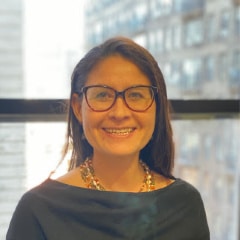
Maya Escueta is a doctoral candidate in the Economics and Education program at Teachers College, Columbia University. Maya’s work focuses on leveraging rigorous quantitative methods and insights from psychology and neuroscience to investigate the role of trauma and adversity on the early developmental outcomes of vulnerable children. She is currently working on a research project using experimental data to examine the role of caregiver aspirations in parental investments and educational attainment in the Gambia (with Alexander Eble), and her dissertation work focuses on the effect of maternal trauma on early childhood development in Sub-Saharan Africa.
Maya’s research agenda is informed by her previous professional experience across research, policy and practice. Prior to joining Teachers College, Maya worked in India for three years with the Abdul Latif Jameel Poverty Action Lab (J-PAL), where she oversaw a randomized controlled trial of a technology-based education intervention, and worked with key decision-makers in the South Asia region to bridge the gap between policy implementation and research. She has also worked as a teacher for inner city youth in Harlem and recently resettled refugees with the International Rescue Committee. Maya holds a Master’s in Public Policy from Duke University, and a B.A. in English and Philosophy from Columbia University. She is a John Jay Scholar (Columbia University) and University Scholar (Duke University), both awarded for interdisciplinary achievement.
The Intergenerational Transmission of Trauma: The Effect of a Mother’s Childhood Exposure to Armed Conflict
Children growing up in poverty are at elevated risk of exposure to potentially traumatic life events. For these children at risk, the quality of early caregiving, and in particular, the attunement of the mother, is critical for mitigating detrimental outcomes from early adversity. However, when the mother herself experiences trauma, this poses an additional risk to children above and beyond the environmental risks they already face because she may be less capable of providing the economic and psychosocial support that a child needs to recover from early adversity. This suggests that maternal trauma, if not properly addressed, may be passed from mother to child through the mother’s behavioral responses to her own trauma. In this paper, I investigate the intergenerational transmission of trauma from mother to child by examining one specific type of trauma: exposure to armed conflict in Sub-Saharan Africa. I do so by first documenting the factors that predict a mother’s resilience in the aftermath of trauma. I then generate causal estimates of a mother’s exposure to armed conflict on her maternal capacities and investments, and the early developmental outcomes of her children.
Amelia Simone Herbert, Teachers College, Columbia University
Amelia Simone Herbert is a PhD candidate in the Anthropology and Education program at Columbia University, Teachers College and a visiting instructor in the Department of Educational Studies at Colgate University. Amelia’s research examines the racial and spatial politics of inequality and aspiration in marketized urban schooling landscapes, particularly in the United States and South Africa. She engages anthropology, comparative education, and African/a studies in her work. Her dissertation explores how students, alumni, staff, and families of a low-fee independent high school in Cape Town, South Africa perceive schooling’s role in facilitating social mobility and broader societal transformation and tensions between these aims. Amelia taught in Newark, New Jersey for nearly a decade and has also worked in teacher education programs that serve schools in New York City and Cape Town. Her experience as a teacher fuels her commitment to research on the complex meanings of schooling in lived experiences. Amelia holds a B.A. in History from Duke University and a master’s degree from Teachers College. Her research has been supported by fellowships from the Ford Foundation, the Fulbright-Hays Program, and the American Association of University Women.
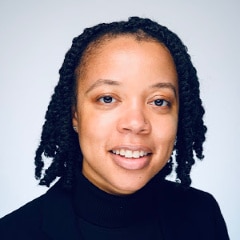
“A Ticket to Life”: Marketized Schooling, Spatial Pedagogy, and the Politics of Aspiration in Cape Town, South Africa
Schooling is a social project of making futures, where youth and families navigate aspirations. The “capacity to aspire” (Appadurai 2004) is unevenly distributed in contexts of disparate conditions of possibility. In Cape Town, enduring apartheid geography that continues to normalize racial and class disparity is made visible and reproduced in part through schooling patterns and outcomes. Yet, schooling is cast as cause and cure for inequalities that consistently top the globe. Post-apartheid reforms and global trends at the turn of the century accelerated processes of education marketization, including a growing sector of low-fee private schools that claim to interrupt entrenched inequality by producing upwardly mobile subjects. My dissertation explores how students, alumni, families, and faculty of a low-fee independent high school in Cape Town’s oldest township perceive schooling’s role in facilitating social mobility and societal transformation and tensions between these aims. Drawing on 21 months of ethnographic research, the dissertation argues that, in contexts of uneven development, aspiration is not simply a temporal striving toward futures, but also a spatial imaginary projecting youth into new spaces. It offers the concept of “spatial pedagogy” to describe school practices of challenging the city’s social geography by facilitating youth transgression of locally significant boundaries. While the dissertation explores the school’s earnest attempts to level uneven terrain, it also draws on theories of racial capitalism to argue that, rather than flattening inequalities related to hierarchies of difference like race, class, gender, and citizenship, marketization of schooling is enabled by, works through, and reconstitutes difference.
Salvador Huitzilopochtli, University of California, Santa Cruz

Salvador Huitzilopochtli is a PhD Candidate in Education at the University of California, Santa Cruz (advisee of Dr. Judit Moschkovich). His research interests include mathematical argumentative writing and Early Algebra with a focus on creating instructional environments that foster equitable outcomes for all students. Mr. Huitzilopochtli’s dissertation project examines how students use mathematical writing to construct and refine more sophisticated mathematical arguments. Assuming a sociocultural view of mathematics, the design study uses Mathematical writing activities to leverage audience, purpose, and students’ full linguistic repertoires to promote reasoning and deepen learning. He earned master’s degrees in Education from UC Berkeley and UC Santa Cruz and a BA (Rhetoric) and Single-Subject teaching credential (Mathematics) from UC Berkeley. Mr. Huitzilopochtli’s research is informed by ten years of experience as a middle-school mathematics teacher and teacher leader in culturally, linguistically, and economically diverse schools in the San Francisco East Bay Area. Mr. Huitzilopochtli’s work centers equity and draws upon his additional experience working in violence prevention, academic support, cultural education, and mentoring.
Using Writing to Support Mathematical Arguments in Early Algebra
Mathematical argument and proof are difficult for students of mathematics to learn; in part because it requires teachers and students to engage the process of reasoning mathematically in new and demanding ways. Typically, students have had little experience with proof and are likely to arrive to the classroom familiar with only empirical proof schemes, which rely on the use of calculation and examples. These challenges are exacerbated in classrooms that serve students from non-dominant communities due to disinvestment, tracking, and re-segregation. This study examines the use of writing to support students in developing mathematical arguments during a unit of instruction on Early Algebra in a predominantly English Learner (Latinx) middle-school classroom. This design-based study will explore how students from non-dominant communities construct and refine mathematical arguments through the introduction and iteration of mathematical writing activities that scaffold the proof process, leverage ‘audience’ and purposes for mathematical writing, and provide opportunities for conferencing and revision. Analysis will consider the ways that students that vary in terms of mathematics achievement and English language fluency change over the course of the study in terms of their mathematical reasoning and use of language when writing mathematically. Results from this study could inform research and practice by better understanding how learning environments that foster language-use that includes writing support multilingual students to develop more analytic proof schemes.
Kathryn Kirchgasler, University of Wisconsin-Madison
Katie Kirchgasler is an Assistant Professor of Science Education at the University of Wisconsin–Madison. Her work investigates relations of power, inequity, and exclusion in STEM, health, and environmental education, with a focus on these fields’ underexamined histories of racialization and coloniality. Her central concern is understanding how research and pedagogy inherit taken-for-granted assumptions that undermine current commitments to equality and justice. In prior projects, she has explored racial disparities in high school coursework, unintended effects of data-driven reforms, and the marginalization of sociopolitical dimensions of science and sustainability in curricular standards. Her research appears in journals including Curriculum Inquiry and Science Education, and she gave an invited keynote at the International Organization for Science and Technology Education meeting in 2018. Katie holds a Ph.D. in Curriculum & Instruction from the University of Wisconsin–Madison and a B.A. in Psychology from Williams College. Prior to her current appointment, she served as a Lecturer of Curriculum and Teaching at the University of Kansas in Lawrence, Kansas. At the K-12 level, she taught elementary and middle school science, first as a Fulbright English Teaching Assistant in Alcalá de Henares, Spain and then in East Boston, Massachusetts.

Tracking by Triage: How Science Education Began Dividing Populations by Perceived Health Needs
This research explores how pedagogies embodying cultural norms of hygienic living contributed to the emergence of tracking, and to the production and regulation of distinct populations in early 20th-century U.S. schooling. As a history of the present, it investigates how educational research racialized pupils classified as Spanish-speaking or Mexican as not-yet-ready to learn science, but instead as needing instruction applied to their alleged health habits and home conditions. The project will entail archival research and analysis of pedagogies circulating across de jure and de facto segregated schools, sociological studies, and settlement house reforms targeting schoolchildren and their families from 1916 to 1946. Leveraging insights from recent scholarship in cultural studies, Chican@/Latin@ Studies, and Science & Technology Studies, the project will uncover the indebtedness of U.S. science education to broader biopolitical projects of school segregation, Americanization programs, and hygiene movements. It will elucidate how pedagogical techniques began to triage populations along a racializing hierarchy of perceived needs—where an ‘immediate need’ for health supervision took precedence over a ‘future need’ to study abstract science. At stake is how similar pedagogies are recommended today as strategies to connect science to the ‘real-life needs’ ascribed to Latinx, Native, and Black students in the name of educational and health equity. As health equity gains momentum as a site of interdisciplinary collaboration, this study promises a more robust understanding of the political stakes, ethical implications, and paradoxical effects of trying to solve public health crises within science classrooms and curricula historically rendered separate and unequal.
Natasha Quadlin, University of California, Los Angeles

Natasha Quadlin is Assistant Professor of Sociology at the University of California, Los Angeles. Her research focuses on social inequality in the contemporary United States, with an emphasis on access and returns to education. As a sociologist who uses quantitative and experimental methods in her work, Natasha is particularly interested in using large-scale surveys and experiments to examine the mechanisms behind inequalities in schools, families, and labor markets. Natasha received her Ph.D. in sociology from Indiana University in 2017. Her work has been published in the American Sociological Review, Social Forces, Sociology of Education, Gender & Society, and other outlets.
Which College Graduates are “Trainable” in Today’s Economy? Considering Gender, Race, and Achievement
In recent years, members of the public have criticized universities for raising costs, but providing students with few job-related skills. A common response to this criticism is that college courses, especially those in the liberal arts, equip students with cognitive skills that make them “trainable” for many white-collar jobs. This study will test this notion from an employer’s perspective. I hypothesize that although many employers view liberal arts graduates as trainable, these perceptions of trainability vary across dimensions such as gender, race, and achievement, with women, racial minorities, and (perhaps especially) racial minority women being most vulnerable to trainability penalties. To test these hypotheses, I will conduct both a résumé audit study and a survey experiment with hiring-decision makers. These related studies are designed to assess how college graduates in liberal arts fields (e.g., classics, philosophy, biology) fare in jobs that are typical of today’s white-collar service economy (e.g., consulting, sales). Results will reveal which college graduates are (and are not) considered “trainable” for work in today’s economy.
Astrid N. Sambolín Morales, University of Colorado
Astrid N. Sambolín Morales is a PhD candidate at the University of Colorado Boulder’s School of Education. She received her M.A. in English Education from the University of Puerto Rico Mayagüez campus and taught writing and ESL classes at several higher education institutions on the island before beginning her doctoral studies. During her time as a graduate student in the Equity, Bilingualism, and Biliteracy program at CU, she has taught several courses addressing policies affecting the academic achievement and schooling experiences of children from minoritized backgrounds. Astrid is also affiliated with the BUENO Center for Multicultural Education, having taught classes for their Master’s program in Educational Equity and Cultural Diversity with a Culturally and Linguistically Diverse (CLD) Endorsement in Bilingual Education. She also worked as a research assistant for the Office of English Language Acquisition National Professional Development Grant awarded to BUENO. Her research with Puerto Rican communities, which incorporates education policy, bilingual education, critical theories of race, critical pedagogy, and disaster research, was funded by several grants from different institutions/organizations, including the University of Colorado Natural Hazards Center, the Center to Advance Research and Teaching in the Social Sciences (CARTSS), the BUENO Center for Multicultural Education, and the URBAN Research Network.
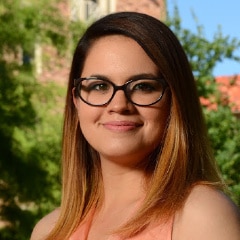
“¿Y este No Era el Sueño Americano?”: Displaced Puerto Rican Mothers’ Agency, Resiliency, and Resistance Post-Hurricane Maria
As a result of the devastating effects of Hurricane María, an estimated 160,000 Puerto Ricans have been displaced. This dissertation study aims to create and explore a learning space—culture circles—that engages displaced Puerto Rican mothers in a critical cycle of problem-posing, dialogue, and problem-solving (Freire, 1973; Souto-Manning, 2010) in relation to the challenges their children face in the receiving mainland U.S. school system, as well as the families’ efforts to survive in the receiving community. Informed by findings from a pilot study conducted in a mainland U.S. receiving school district, this study will draw on video recordings from culture circles and weekly audio reflections collected from displaced Puerto Rican mothers of children enrolled in Denver schools since their displacement. The goal is to capture portraits of participating mothers’ agency, resistance, and resiliency as they navigate the mainland U.S. school system and receiving community through small, daily acts as well as more public ones. Findings would contribute toward a more nuanced understanding of the relocation processes of displaced Puerto Rican families in other states, the relocation processes of other displaced/immigrant/refugee populations, and the role of schools and other informal learning spaces in supporting these populations. Moreover, findings will also inform a reframing of theoretical stances used to interpret the experiences of immigrants/refugees/displaced persons by highlighting acts of agency and resiliency that resist oppressive conditions through a critical inquiry model, contributing to our understandings about the cultural and socioemotional dimensions of relocation.
Rebecca M. Taylor, Suffolk University
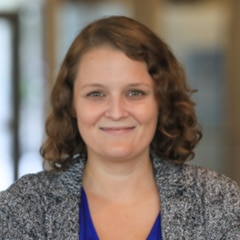
Rebecca M. Taylor is currently an Assistant Professor of Education at Suffolk University and will join the College of Education at the University of Illinois at Urbana-Champaign in July 2020 as an Assistant Professor in the Department of Education Policy, Organization, and Leadership. After earning a Ph.D. from the Graduate School of Education at Stanford University in 2014, Dr. Taylor worked as a Research Associate in the Stanford Criminal Justice Center at Stanford Law School and then as a Postdoctoral Fellow and Director of the Ethically Engaged Leaders Program at Emory University’s Center for Ethics. As a philosopher and educational researcher, she uses philosophical inquiry and philosophically-grounded mixed methods to investigate questions of ethics and justice in educational policy and practice. Her research has been funded by the Spencer Foundation and the Center for Ethics and Education at University of Wisconsin and has appeared in journals including Harvard Educational Review, Educational Theory, Journal of Philosophy of Education, Democracy and Education, and Educational Philosophy and Theory.
Open-Mindedness on Campus: Justice, Inquiry, and Political Polarization in Twenty-First Century Higher Education
Colleges and universities are currently engaged in public negotiation of the value of open-mindedness for knowledge-seeking on campus in today’s politically polarized context. The principles of academic freedom and free speech have long grounded a set of norms in higher education that encourage open-mindedness, yet campus activists in recent years have challenged that these norms undermine justice. This clash of perspectives regarding open-mindedness is particularly apparent in two contexts: 1) debates surrounding controversial speakers on college campuses, and 2) debates about new state legislation seeking to regulate free speech and/or advance politicized conceptions of intellectual diversity on campus. This project uses two lines of inquiry to examine these contexts and consider the value of open-mindedness on college campuses today. First, I apply conceptual tools drawn from epistemology to a content analysis of cases of public debates in the two contexts above. This analysis brings philosophical insights to bear on understanding the contrasting epistemological foundations and perspectives on open-mindedness that emerge in these debates. Second, I use normative, philosophical analysis to argue that these debates call on institutions of higher education to reconsider the relationship between open-mindedness, inquiry, and justice and the implications for their policies and practices.
Margaret Vigil-Fowler, Independent Scholar
Meg Vigil-Fowler is an historian of medicine who studies how constructions of race and gender influence who can participate in science and medicine and how persistent lack of diversity in the medical profession contributes to the perpetuation of racial health disparities in the United States. Her current research focuses on the history of African American women physicians who trained between the Civil War and the start of the Second World War. She has written articles on Black women physicians’ medical educations and Black women physicians’ unique roles in public health. Meg is currently writing a collective biography of the first ten African American women who earned medical degrees. She recently received her doctorate from the Department of Anthropology, History, and Social Medicine at the University of California, San Francisco. Her work has received funding and awards from the Drexel University College of Medicine Legacy Center Archives & Special Collections and the American Association for the History of Medicine.

Determined To Rise: The History of Educating Black Women Physicians, 1864-1941
Lack of diversity in medicine continues to cost people of color their longevity and well-being. Studies indicate that patients of color receive better care when their provider is also a person of color and the same gender (a phenomenon known as “concordance”). As early as the nineteenth century, Black women understood that if they became physicians, they could provide care to African Americans who otherwise did not receive it—especially women and children—and address some of the racial health disparities they observed. To do so, they first needed medical educations, and they primarily relied on two HBCUs, Howard and Meharry, to obtain training. My study investigates how these schools treated their African American women students. It will also provide insight as to why these women chose these particular medical schools for their training and why these two schools were more receptive to Black women students than even other historically black schools or women’s schools. Through extensive analysis of archival sources using network analyses, comparative cohort analysis, Critical Race Theory and intersectionality, my research will investigate their educational experiences at these two schools and uncover what comprised their premedical educations. This research will provide an historical understanding of educational opportunities available to African American women and how they used them to become physicians in underserved communities. My historical analysis holds profound implications for diversifying the medical profession and addressing inequities in African American women’s health today.
